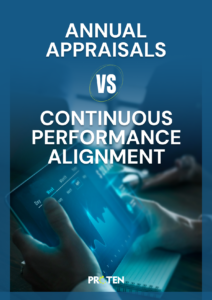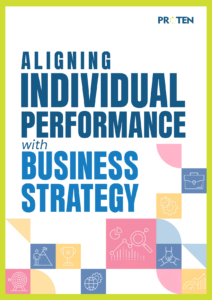Picture this scenario: It’s 2035, and we’ve entered yet another golden age of technology we never thought we could achieve. It manifests in all areas of life and business, especially in your company. Even down to your basic roles, including your performance management process.
On one of your biannual performance reviews an employee you’ve been monitoring for a while walks into your office. They’ve been on a performance improvement plan for the past three months to prevent getting fired, and it’s finally time for them to receive a report on their recent performance. But as they take their seat across your desk, they notice a strange thing. That it is not you, sitting across them, but a humanoid robot occupying your usual seat.
A holographic projection of your face appears on the robot’s chest, delivering pre-scripted feedback and numerical ratings. Your employee looks bewildered, then disappointed. They thought they were going to be able to discuss with you, face to face. Human, to human.
As much as this scenario seems far-fetched, we can’t say it is impossible. With the rise of technology over the years and the need to integrate advanced processes into our daily lives and businesses, we can expect something like that to happen. We’re already seeing an integration of technology in business processes today.
Flair HR reports that automation could increase global productivity growth by 0.8-1.4% annually, with 76% of businesses currently using automation for standardizing daily workflows. But does this mean that automation is going to take over the process of performance management? Well, while technology offers efficiency, the human element remains indispensable for effective performance management. And you’re going to see why, as you read on.
The Rise Of Automation In HR
In recent years we have witnessed a seismic shift in the realm of human resources. Being a global consulting agency for businesses, we’ve witnessed firsthand what was once a domain dominated by paperwork, intuition, and interpersonal skills, turn into one increasingly characterized by data, algorithms, and automation.
This transformation is driven by a host of factors, such as the relentless pursuit of efficiency, the availability of advanced technologies, and the growing volumes of data generated by organizations.
Standing at the forefront of this change is the digitization of HR processes. Tasks that were once labor-intensive and prone to human error, like payroll, benefits administration, and employee record-keeping, are now automated through HR information systems.
Because of this, we’ve seen significant improvements in accuracy, speed, and cost-effectiveness. Moreover, automation has extended its reach into talent acquisition, with tools capable of sifting through vast numbers of resumes, scheduling interviews, and even conducting initial candidate screening.
Also subject to automation’s influence, is performance management. Software platforms can now track employee performance metrics, set goals, and provide automated feedback. This data-driven approach promises greater objectivity and transparency in performance evaluations.
However, while these technological advancements offer undeniable benefits, they also raise concerns about the potential dehumanization of the workplace.
By automating routine tasks, HR professionals like yourself are freed up to focus on more strategic initiatives, such as talent development, employee engagement, and organizational culture. Yet, as technology continues to evolve, there is a risk of becoming overly reliant on data and algorithms at the expense of human judgment and connection.
The Human Side Of Performance
When you hear the word performance, especially in HR, you would likely associate it with a collection of metrics and data points. But it’s more than just that. Performance is also a complex interplay of skills, motivations, emotions, and relationships.
If you take your time to observe the process, you’ll find that it’s fundamentally human. While technology can quantify certain aspects of work output, it falls short of capturing the nuances of human behavior, motivation, and potential.
Soft skills, often intangible and difficult to measure, are critical to overall performance. Empathy, communication, teamwork, and problem-solving abilities are essential for navigating complex work environments and building effective relationships. These skills, while crucial for success, are often overlooked in data-driven performance management systems.
Moreover, individual motivation and engagement are powerful drivers of performance. Feeling valued, challenged, related with, and supported can significantly impact your employee’s willingness to go the extra mile. Human interaction plays a pivotal role in fostering these conditions. Managers who take the time to understand their employees’ aspirations, provide meaningful feedback, and offer growth opportunities create a climate where employees feel inspired and motivated.
Finally, performance and organizational culture are deeply intertwined. A positive and inclusive culture can enhance employee well-being, foster collaboration, and drive innovation. Human connection is essential for cultivating such a culture. Shared experiences, open communication, and a sense of belonging are fostered through interpersonal relationships.
In essence, while technology can provide valuable insights into performance, it cannot replace the human element. To truly understand and optimize performance, you need to dig deep into the complexities of human behavior, motivation, and relationships.
The Limitations Of Technology in Performance Management
It is no doubt that technology has transformed the HR landscape. However, it is essential to recognize that even technology and automation have their limitations. And those limitations are not excluded in the realm of performance management.
A primary challenge lies in the inability of technology to fully capture the complexities of human performance. Data-driven systems excel at quantifying tangible outputs, but they struggle to assess intangible qualities such as creativity, innovation, and interpersonal skills.
Moreover, technology can perpetuate existing biases. Algorithms are trained on historical data, which may contain biases that can be amplified and reinforced by automated systems. If performance metrics are narrowly defined, they can inadvertently discourage employees from taking risks or pursuing innovative ideas.
Another limitation is the potential for a detachment between employees and the performance management process. Overreliance on technology can create a sense of distance and reduce opportunities for meaningful conversations between managers and employees. Performance management should be a collaborative process, focused on development and growth, rather than a mere data collection exercise.
Finally, technology cannot replace the human ability to build trust and rapport. Effective performance management requires a strong foundation of trust between managers and employees. Technology can facilitate communication, but it cannot replicate the depth and nuance of face-to-face interactions.
So while technology is a valuable tool, it is essential to recognize its limitations and to prioritize the human element in performance management. By combining the best of both worlds, you can create a more holistic and effective approach to developing and engaging your workforce.
The Power Of Human Connection in Performance Management
Human connection is the bedrock of effective performance management. It is through relationships that trust, empathy, and understanding are cultivated, and these create an environment where your employees feel valued, supported, and motivated. When your employees feel connected to you, as well as their colleagues, they are more likely to be engaged, committed, and invested in their work.
Empathy, a cornerstone of human connection, allows you to see your employees as more than just workers. You now see them as individuals with stories, strengths, weaknesses, and aspirations. By understanding their perspectives, you can provide the support, guidance, and feedback that they need. This approach encourages your employees to be open, honest, and receptive to development opportunities.
Moreover, human connection facilitates effective communication. Regular check-ins, one-on-one meetings, and open-door policies create opportunities for employees to share their thoughts, concerns, and ideas. These interactions not only build rapport but also provide valuable insights into employee engagement, motivation, and performance.
Strong relationships between you and your employees also play a crucial role in employee development. Mentorship, coaching, and sponsorship are essential for career growth. By investing time in your employees’ development, you can unlock their potential and create a high-performing workforce.
In essence, human connection is the catalyst for a thriving workplace culture. It fosters trust, empathy, communication, and development, all of which are essential for driving employee engagement and performance. By prioritizing human interaction, you can create a workplace where your employees feel valued, supported, and inspired to excel.
Balancing Technology And Human Connection
The best approach to performance management lies in harmonizing the strengths of technology and human interaction. Technology can be a powerful tool when used strategically to augment human capabilities rather than replace them.
By leveraging technology to automate routine tasks, such as data collection and analysis, you can free up time to focus on higher-value activities like coaching, mentoring, and employee development.
Additionally, data-driven insights can provide valuable context for performance conversations, allowing managers to have more informed and targeted discussions.
However, it is essential to avoid becoming overly reliant on technology. Performance management should be a human-centric process that prioritizes relationships, empathy, and development. Regular one-on-one meetings, face-to-face feedback sessions, and opportunities for informal interaction should remain core components of the performance management framework.
A hybrid approach that combines technology and human interaction can create a more engaging and effective performance management experience.
For example, you can use technology to facilitate goal setting, track progress, and provide automated feedback, while also incorporating regular check-ins and performance development plans that focus on building relationships and providing personalized support.
Ultimately, the key to success lies in finding the right balance between technology and human interaction. It’s important that you carefully consider your specific needs and culture when designing your performance management systems.
By leveraging technology to enhance the human element, you can create a performance management process that drives employee engagement, development, and overall organizational success.
Final Thoughts…
We live in an era currently dominated by data and automation, so it is tempting to believe that technology can fully replace human interaction in performance management. However, the evidence suggests otherwise. While technology offers efficiency and insights, it cannot replicate the nuanced understanding, empathy, and trust that are fostered through human connection.
Performance management is fundamentally about people. It is about recognizing individual strengths, providing support, and inspiring growth. Technology can be a valuable tool in this process, but it should never overshadow the importance of human interaction. By prioritizing relationships, empathy, and development, you can create a workplace culture where your employees feel valued, engaged, and motivated to excel.
So, what step should you take?
You must strike a balance between technology and human connection. By leveraging technology to augment human capabilities and focusing on building strong relationships, organizations can create a performance management system that drives both individual and organizational success. Ultimately, the human touch remains the most powerful catalyst for unlocking employee potential and fostering a high-performance culture.
As a leading global HR and business consulting agency, we like to provide insight into ongoing and future business trends, with ideas that will keep you (and your employees) on top of the game. And one way we like to do so is through our webinars. Join us on LinkedIn on July 24th, 2024, where Chioma Muo and Gbenga Olugboye, the head and team lead of our outsourcing services, give insight on how to foster inclusion for a successful collaboration. We can’t wait to see you there.











